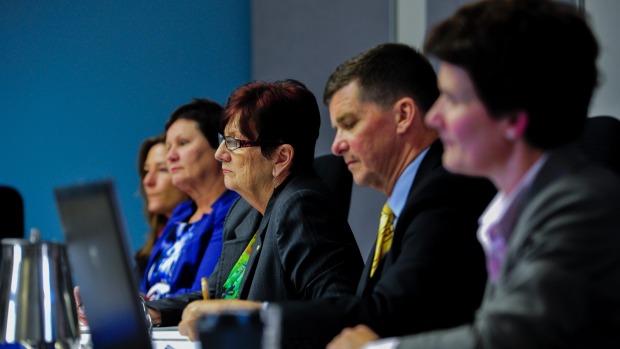
Mary Porter MLA, centre, during the inquiry into the proposed Appropriation (Loose-fill Asbestos Insulation Eradication) Bill at the ACT Legislative Assembly. Photo: Melissa Adams
A Legislative Assembly committee has raised serious doubts about the ACT Government’s response to the loose-fill asbestos crisis and called for a board of inquiry into the Mr Fluffy legacy.
The wide-ranging and lengthy report issued on Wednesday evening by the Standing Committee on Public Accounts makes a number of recommendations to boost the flexibility of the scheme, such as costing the proposal to allow Mr Fluffy homeowners to retain their blocks and amending the scheme to offer a viable knock-down and rebuild option.
The Inquiry into the Proposed Appropriation (Loose-Fill Asbestos Insulation Eradication) Bill 2014-2015 also considers a “go it alone option” for property owners to manage the process themselves, as well as exempting certain homeowners from the scheme on strict conditions.
Meanwhile, a Board of Inquiry would “investigate the full history of the Mr Fluffy legacy” and should report back by March 1, 2016.
The document’s 62 recommendations also address the mental health and wellbeing of Mr Fluffy residents, the impact of the buy-back scheme on the property market and compensation.
It was due to be released on Wednesday afternoon, ahead of the debate on an appropriation bill in the Legislative Assembly on Thursday.
But Committee staff scrambled over a number of hours to publish and distribute the document, leaving little time for Assembly members to consider its recommendations.
The delay suggests a lengthy debate about the report’s recommendations.
The “go it alone option” would include “appropriate compensation, a reissued lease, suitable timeframes with safeguards and validation process” for residents who want to manage the process themselves.
The committee “strongly believes that the Government should show some flexibility for those in extenuating circumstances” and exempt certain homeowners from the scheme altogether.
But exemptions should only be made if owners have been informed of the risks in writing and agree to make no renovations or alterations to their loose-fill asbestos homes without government approval, according to the report.
Other key recommendations include investigating alternative sites for the disposal of contaminated waste and the establishment of a statutory body to conduct the “demolition, remediation, rezoning and sale of the surrounded blocks.
Mr Fluffy’s impact on the ACT budget is expected to see the deficit blow out by $600 million over two years.
If passed, the bill will give authority for the spending of $762 million on the buy-back and remediation process. That price tag includes $338 million for buying and demolishing the houses and other expenses and $412 million for buying the land, plus $12 million for interest in the current financial year.
Another $250 million is expected to be appropriated in the 2015-16 financial year.
A number of recommendations also concern the emotional wellbeing of Mr Fluffy families, particularly vulnerable residents, with calls for long-term support services and ensuring the scheme can respond to diverse circumstances.
The report also recommends assessing ways to mitigate the impact of the buy-back scheme on the property market, including affordable housing, and alternative land release options.
Increasing grant sizes in light of evidence given to the committee, and to cover legal costs, is also recommended.
The committee also suggests the government investigate the suggestion that some owners had prior knowledge of the scheme before the details were released on October 28.
Opposition leader Jeremy Hanson said the Canberra Liberals will support the government’s appropriation but will urgently call for the scheme to be modified to be fairer and more flexible.
“It would be utterly irresponsible for the government to ignore every recommendation, especially in this case where hundreds of lives have been affected and hundreds of millions of dollars of taxpayers’ money is involved,” he said.
